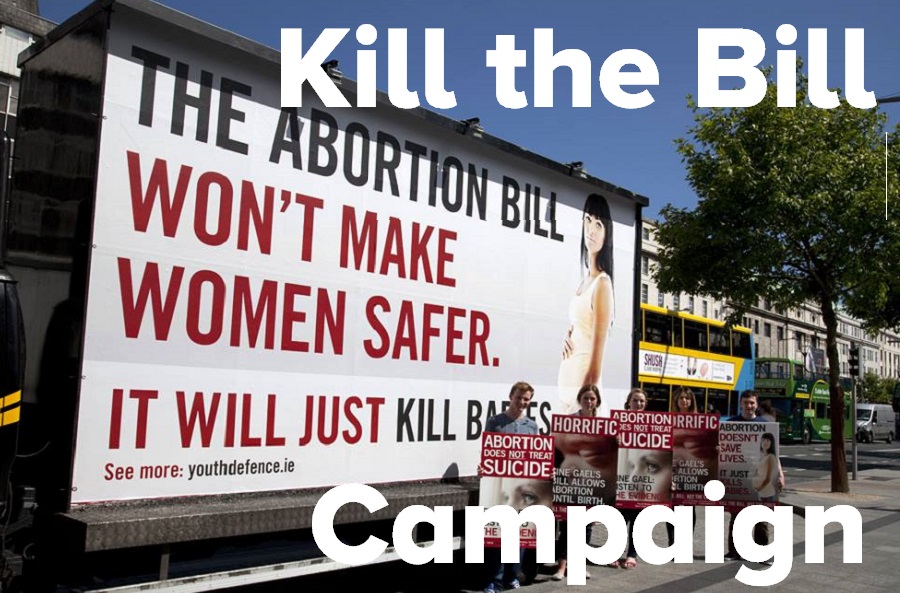Truth about the Bill
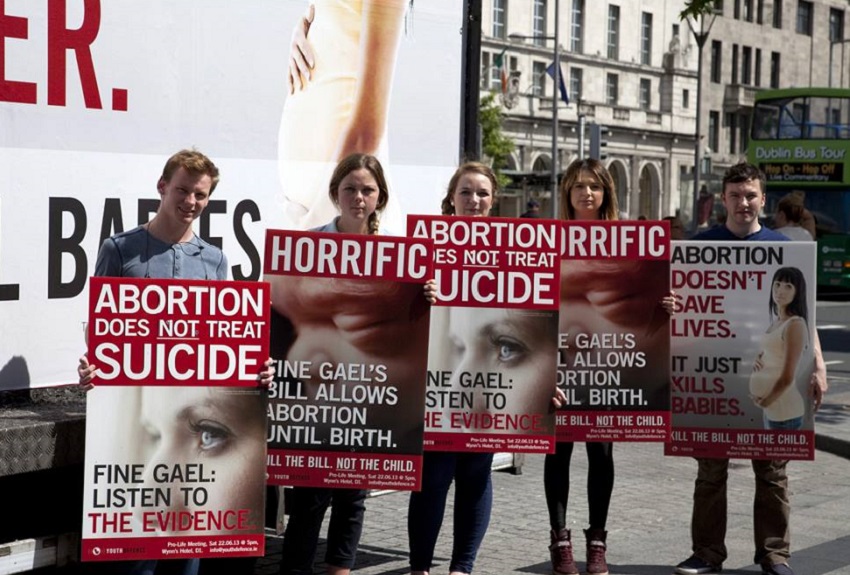
Right now, a massive nationwide campaign is revealing the truth about the Government's Abortion Bill. 6,000 posters and billboards spell out the cruel and horrific nature of the Bill, which allows abortion until birth and ignores the evidences which shows abortion is never a treatment for suicidality. Striking newspaper adverts in 35 local newspapers and a nationwide leaflet drop also spell out why this Bill must be rejected.
Here's the TRUTH this campaign exposes.
1. Abortion is NOT a treatment for suicidality.
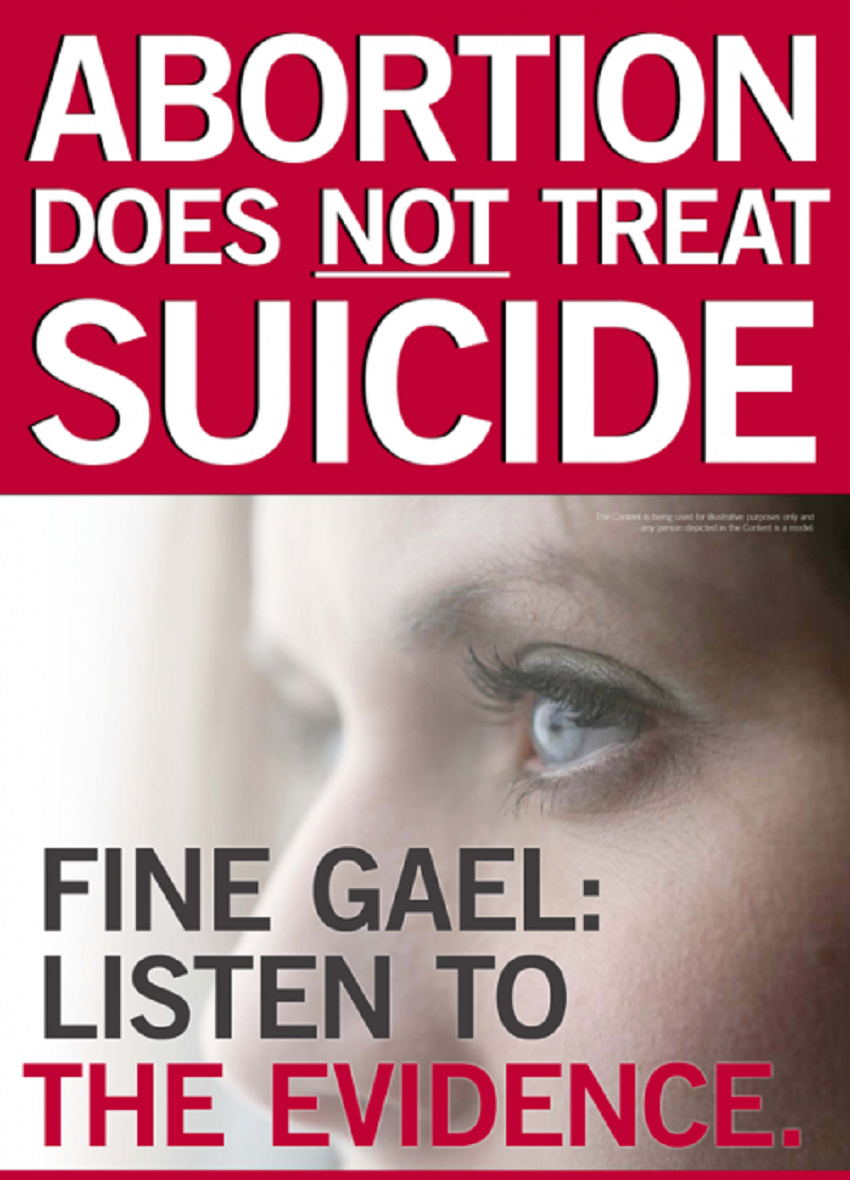
The government has held two hearings where it invited leading medical experts to share their experience and expertise in relation to this matter. They then proceeded to absolutely ignore the evidence that shows abortion is not a treatment for suicidality.
The Master of Dublin's busiest Maternity hospital, Dr Sam Coulter Smith, told the recent Oireachtas Committee hearings that there are 'major ethical and moral dilemmas' arising for Obstetricians from the draft abortion Bill.
He also warned that it was his view, and that of his colleagues, that a possible 'surge' in the number of abortions would arise if the proposal became law.
Dr Coulter Smith said that there was no evidence that abortion was a treatment for suicidal ideation or intent, and that obstetricians were required to provide and practice evidence-based medicine.
He said that...
Our psychiatric colleagues tell us that there is currently no available evidence to show that termination of pregnancy is a treatment for suicidal ideation or intent and, as obstetricians, we are required to provide and practice evidence-based treatment.
The legislation, therefore, created an ethical dilemma for any obstetrician who is requested to perform a termination of pregnancy for the treatment of someone with either suicidal ideation or intent, he argued.
Dr Coulter Smith said that the fact that there is no gestational limit in the legislation relating to suicidality was a "a major ethical issue for obstetricians" and a source of serious concern.
Fellow Obstetrician, Dr John Monaghan, of Portiuncula Hospital, said he was extremely unhappy with the idea of Obstetricians becoming "mindless terminators for psychiatric reasons" and that the psychiatric or suicide risk clause has been brought in other jurisdictions and has been widely abused.
Psychiatric experts have rejected the Bill as being fatally flawed - and more than 130 psychiatrists have now agreed with a statement opposed legalising abortion on suicide grounds.
Ireland's top expert on suicide and its causes, psychiatrist Professor Kevin Malone, said that the proposed abortion legislation could accelerate suicide rates in younger men because it would help to 'normalise' suicide.
"Contrary to the notion of it saving the lives of an extremely small number of females, it may be placing a greater number of young male lives at risk," he said.
He argued that abortion was not an evidenced based treatment for mental illness and asked "as a clinician, I wonder how then it can overnight become a recommended psychiatric treatment in Ireland."
Top perinatal psychiatrist, Dr John Sheehan, said that...
Patients who were suicidal needed professional help, not an urgent termination of pregnancy. The proposal would make "psychiatrists the gatekeepers to abortion", he said, adding that since psychiatrists were unable to predict the future, the Bill would lead to multiple "false positives". He warned that late term abortion could have a very negative effect on the woman's mental health, and that abortion could increase the risk of mental health problems amongst women.
2. Horrific: This bill allows abortion until birth.
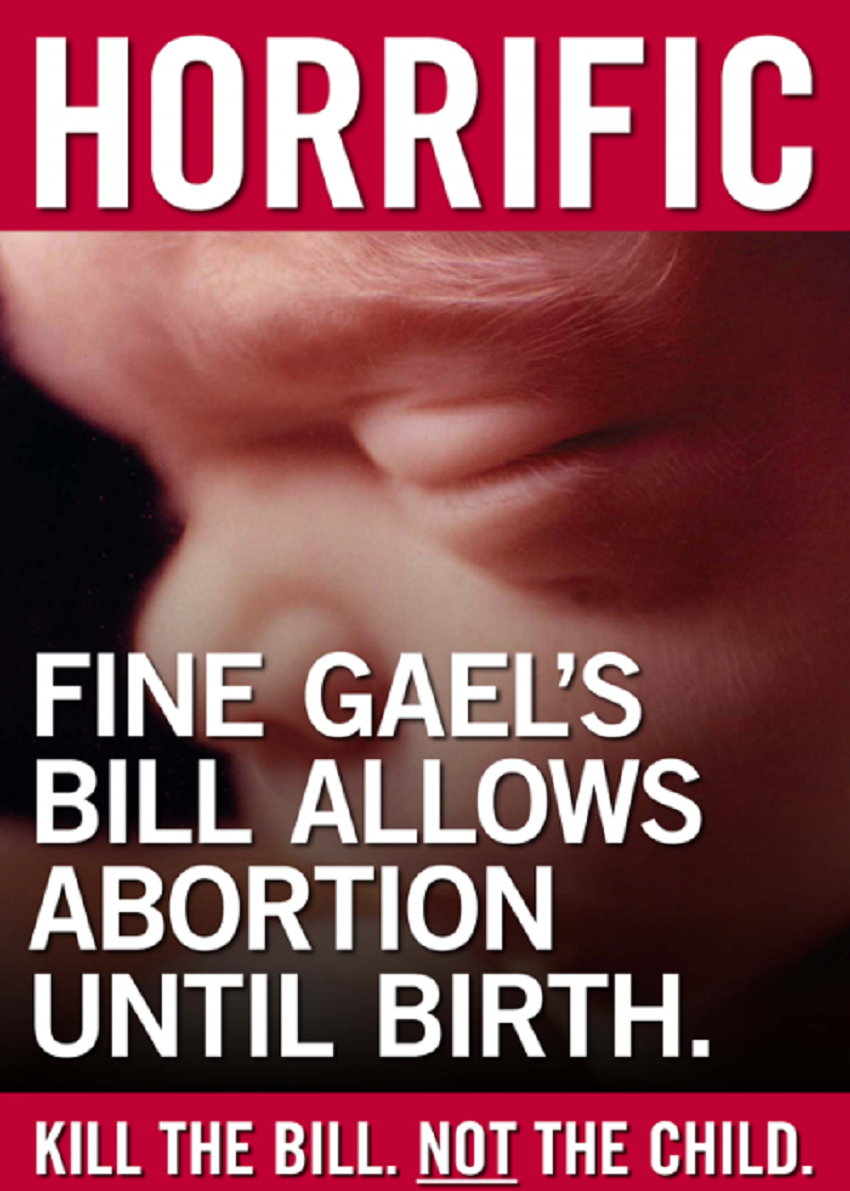
The Bill permits abortion until birth on suicide grounds. There are no term limits in the proposed legislation, since there are no term limits in the X case.
This has been confirmed by Minister Alex White, who said there would be "no time limits" in the Bill, and by Minister James Reilly who told Newstalk that "there are no term limits with the abortion legislation because it is not possible under the Constitution".
Under Section 9 of the Bill, the threat of suicide need not be inevitable nor immediate.
Supporters of the Bill have denied that late-term abortions will be carried out, and argue that doctors would be required to protect the life of the baby after viability.
But there are two key issues here:
A. Where a mother says her pregnancy is causing her to be suicidal, while her child lives, the threat of suicide remains. The death of the unborn child - not the ending of the pregnancy - will then be the aim of the procedure under this Bill.
What does Section 9 say? It states that it "shall be lawful to carry out a medical procedure" "in the course of which, or as a result of which, an unborn human life is ended" where "there is a real and substantial risk of loss of the woman’s life by way of suicide."
Clearly this is a very different scenario than a physical complication which requires a baby to be delivered early. In those instances, it is the complication which gives rise to the intervention, and the death of the child is not the aim of the procedure.
But in the case of suicide, a whole new scenario arises.
This is consistent with the Supreme Court ruling in the X case and, in particular, with Justice Finlay's ruling that suicidality is a basis for the termination of the life of the unborn child - they were his words, he stated that the life could be terminated, not just the pregnancy, where the risk of suicide arises. If the government - against all the medical evidence, will lawfully allow abortion as a treatment for suicidality, then the death of the baby is the purpose of the intervention.
Of course, the evidence of all the medical experts is that abortion is not a treatment for suicidality. The government needs to listen to the evidence, and overturn X, not legalise abortion.
B. In any case, viability arises at 24 weeks.
Aborting a baby at 23 weeks is a gruesome and horrendous procedure, usually involving a lethal injection to the heart, or dismemberment of a child who has been fully formed for several months.
We have seen from the experience of other jurisdictions that legalising abortion on suicide grounds or mental health grounds has been widely abused: in California, despite very restrictive legislation, more than 61,000 abortions were carried out on mental health grounds in one year alone. In Britain, supposedly restrictive legislation has now led to a horrifying 190,000+ abortions every year, with 36% of those being repeat abortions.
Also
The Bill could force doctors to deliver healthy babies prematurely - even where a mother is physically healthy.
In order to distract from the horror of late term abortion, Health Minister James Reilly is suggesting that, after 6 months gestation, the unborn baby could be delivered prematurely and kept alive.
That would deliberately inflict all the serious problems of extreme prematurity on a physically healthy baby, being born to a physically healthy mother.
Some of those problems include: brain damage, cerebral palsy, blindness, deafness, developmental problems - and even death.
All decent doctors would be appalled at this prospect - and many leading doctors have already expressed their deep concern at this proposal. But the government is refusing to listen.
3. Abortion does not save lives. It just kills babies.
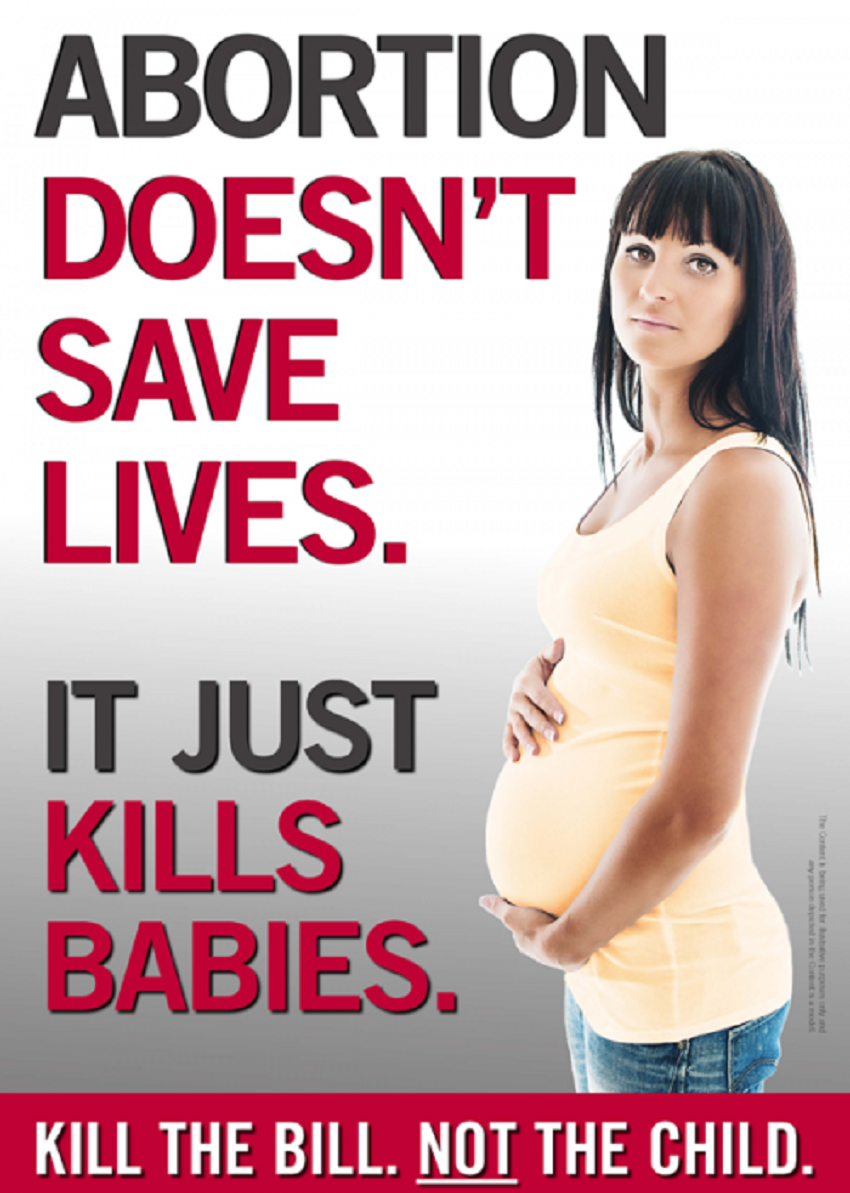
Irish doctors are obliged to intervene to end a pregnancy if a mother's life is in danger. But they will do everything they can to save baby too, and often both lives are saved. However, sometimes the baby's life is lost. According to top medical experts, that's not the same thing as abortion, where the baby is deliberately killed, and the whole aim of the procedure is to end the life of the baby.
Dr Sam Coulter Smith, the Master of the Rotunda, told an Oireachtas Committee hearing in May of this year that life-saving medical procedures which sometime may lead to the loss of the baby's life should never be described as abortion:
"When we are talking about saving mothers' lives, we should not use the terms 'abortion' and 'saving mothers' lives' in the same sentence, full stop. It is a dreadful reflection on anyone who would actually do that. This is about saving mothers' lives, preserving dignity and not stigmatising anybody. These are wanted pregnancies, loved pregnancies, and intervention has to be made to save the mother's life.
"The tragic case of Savita Halappanavar has been shamefully exploited by abortion campaigners. Both the inquest and the HSE investigation showed that she died because of mis-management of sepsis arising in pregnancy. Had the sepsis been spotted it would have been both and legal to deliver her baby. May she Rest In Peace.
There are 5 important points to remember:
- Abortion is the deliberate and intentional destruction of an unborn child. Medical treatment is any treatment needed to save a pregnant woman’s life - including premature delivery of the baby if required. Even though the baby may not survive, every reasonable attempt to save the baby’s life would be part of the medical intervention.
- These medical treatments are NOT abortions, they are not considered abortion by the professional, and abortion campaigners are being both dishonest and insensitive to mothers to pretend otherwise.
- If ANY medical condition arises during pregnancy, such as cancer or ectopic pregnancy, doctors in Ireland are obliged to ALWAYS treat the mother even if that gives rise to the unintentional death of their baby. That’s because the intent of the treatment is to save the mother, not to kill the baby.
- The guidelines of the Irish Medical Council state that doctors are obliged to give all necessary medical treatment to pregnant women, even if causes the unintentional death of their unborn child. Furthermore, they state that if doctors fail to treat women in these situations, they may be struck off the register. The government can provide better clarity to doctors without legalising abortion.
- Ireland, without abortion, has a very low rate of maternal deaths. Britain, on the other hand, with easy access to abortion, has a maternal death rate almost twice as high as Ireland. Doctors giving evidence at the government's abortion hearings in January confirmed that not one woman in Ireland had died because doctors were not able to intervene due to our pro-life laws.
So let's stop the spin. Women and doctors deserve clarity and honesty. There's always a better answer than abortion.
